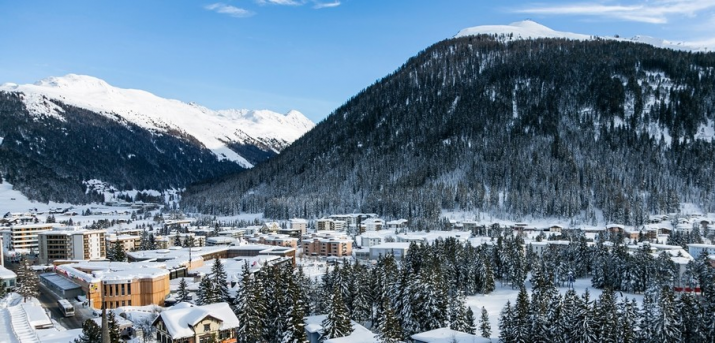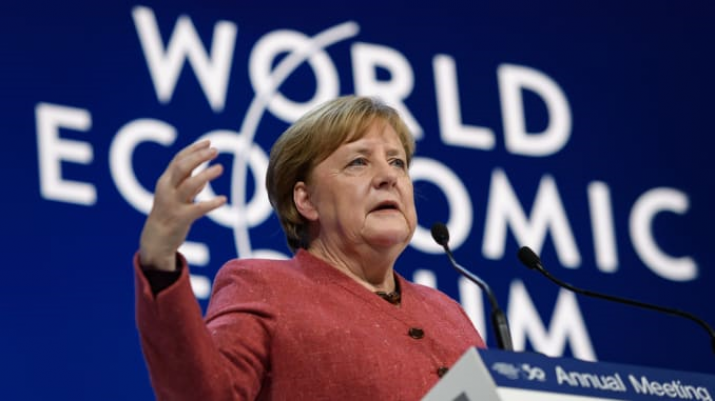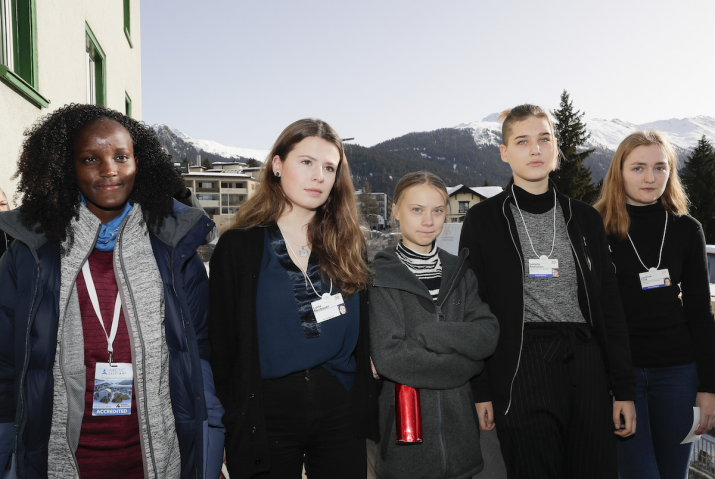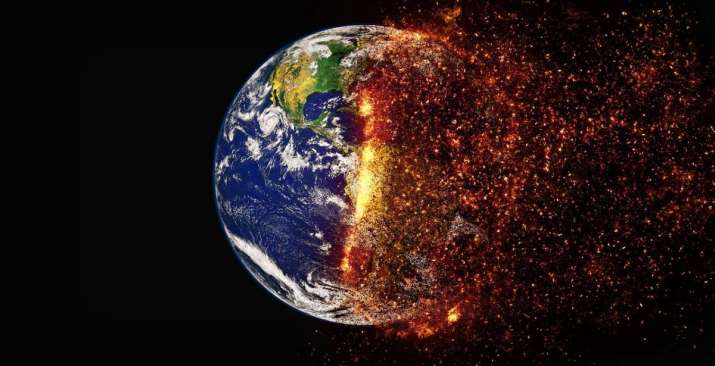FEATURES|COLUMNS|Coastline Meditations
“Our House Is Still on Fire:” World Economic Forum 2020 Convenes on the Topic of Sustainability
 Davos, Switzerland. From weforum.org
Davos, Switzerland. From weforum.orgIn the early Buddhist canon, there is a passage in which a devata goes to the Buddha and makes a speech about the urgency of giving, using as an allegory the imagery of a house on fire. Without the act of giving, says the devata, a house on fire will only continue to burn. If one responds to the tragedy with greed, the scraps of the house will turn to ashes or will be stolen; either way, they will be lost as fire and destruction give way to more fire and destruction. In order to break the cycle and enter the “heavenly realm” we must instead recognize that our possessions—just like our bodies—are transient and will only bear fruit when shared with others.
Climate activist Greta Thunberg has famously used the house on fire as an allegory for the state of the world, and during this year’s World Economic Forum (WEF), which took place from 21–24 January, she reminded attendees that “our house is still on fire.” (World Economic Forum) The event, which is in its 50th year and is traditionally held in the Swiss mountain town of Davos, is controversial. Many criticize its exclusivity (only pass-holders are allowed into the town during the event) and see it as a schmooze-fest for the richest and most powerful people in the world, many of whom arrive in private jets and expensive cars that emit high levels of carbon dioxide.
This year, a group of grassroots climate activists carried out a three-day, 80-kilometer march over the Swiss Alps in order to confront the heads of corporations about the harm their business practices are causing the planet. Prior to the event, Greenpeace International executive director Jennifer Morgan told the Independent news website: “We discuss every year whether to go or not to go and it is a valid question. Once you’re in that space, you’re not able to be as much of an activist except in the way that you engage people. But I think if you’re an organization that wants to speak truth to power, it is an opportunity to do that.” (Independent) However, Morgan highlighted that planting trees—a promise made by the WEF to counteract the event’s carbon footprint—is far from meeting activists’ call for bankers at Davos to commit to phasing out fossil fuels.
 German Chancellor Angela Merkel. From cnbc.com
German Chancellor Angela Merkel. From cnbc.comHigh on the agenda was the issue of the future of capitalism, with many attendees and business leaders agreeing that the West’s current economic model is harmful to the planet and needs to be improved. German Chancellor Angela Merkel stated: “The whole way that we do business, that we live, and that we have grown accustomed to in the industrial age, will have to be changed. We will have to leave that behind us in the next 30 years and we have to come to completely new value chains.” (World Economic Forum) US President Donald Trump was the only guest speaker to ignore the topic of climate change and sustainability, and his speech has been criticized for targeting voters at home, rather than being relevant to a global audience.
For the first time, Davos welcomed teenage delegates to the event so that they could share their stories and engage with world leaders. Having inherited a planet that is both figuratively and literally “on fire,” it is clear from the youths’ speeches that discussions about the current and future state of world economics cannot be separated from the topic of sustainability. While Thunberg criticized attendees for simply talking about making changes rather than taking meaningful action, her peers brought to the table many sustainable practices that have benefited the planet. Gary Bencheghib, an activist from Bali, emphasized that during the time it took him to give his talk “200 metric tonnes of plastic will have entered our ocean.” (World Economic Forum) In order to raise awareness of this issue, he and his brother have made kayaks out of plastic bottles, which they use to travel among some of the world’s most polluted rivers. Puerto Rican activist Salvador Gómez-Colón stated that: “Young activists aren’t just talking about the issues impacting their world, they’re taking action.” (World Economic Forum) He is the founder of the Light and Hope for Por Puerto Rico campaign, which provided victims of Hurricane Maria with solar-powered lamps and hand-powered machines.
Another young delegate was Mohamad Al Jounde, who fled from Syria to Lebanon in 2013, at the age of 12. He subsequently set up a school for refugees that has assisted more than 7,000 pupils to better integrate into their host country. In his speech, Al Jounde asked that attendees not only focus on issues related to climate change but take into consideration all of the world’s difficulties: “Climate change is an important issue, I recognize that. It’s going to affect everyone and we need to work on it. But the problem is, if we focus on that specific issue and other issues like education, equality, and health are forgotten, the rest of the world wouldn’t be able to join the fight for climate change.” (World Economic Forum)
 Climate activists in Davos, 24 January 2020. From left: Vanessa Nakate, Luisa Neubauer, Greta Thunberg, Isabelle Axelsson, and Loukina Tille. From buzzfeed.com
Climate activists in Davos, 24 January 2020. From left: Vanessa Nakate, Luisa Neubauer, Greta Thunberg, Isabelle Axelsson, and Loukina Tille. From buzzfeed.comAl Jounde’s point could not be more pertinent in light the fact that a US news agency, while reporting on WEF 2020, silenced the voice of a whole continent when it cropped Ugandan attendee Vanessa Nakate out of a photograph it tweeted. Nakate, who spoke at a news conference on climate change, was the only person of color to pose for the picture alongside four other young activists, who included Greta Thunberg. The Associated Press’ director of photography later claimed that the photo was altered for composition reasons. But in a video that went viral, Nakate highlighted the inherent racism of this action, explaining that it has the devastating effect of erasing black and brown voices from the debate around climate change.
“We don’t deserve this. Africa is the least emitter of carbons, but we are the most affected by the climate crisis,” Nakate said. “You erasing our voices won’t change anything. You erasing our stories won’t change anything.” (The Guardian)
Will the media and the Davos elite take heed of this message? Will Nakate and other non-white representatives be provided with the appropriate platform to make their case? Will the leaders of the most powerful corporations take the necessary actions to put out the fire and provide a sustainable future for this planet? While only time will tell, one thing is for sure: today’s youths have a lot to teach us when it comes to watering the fruits of harmony.

When a house is on fire
the vessel salvaged
is the one that will be of use,
not the one left there to burn.
So when the world is on fire
with aging and death,
one should salvage [one's wealth] by giving:
what’s given is well salvaged.
What’s given bears fruit as pleasure.
What isn’t given does not:
thieves take it away, or kings;
it gets burnt by fire or lost.
Then in the end
one leaves the body
together with one’s possessions.
Knowing this, the intelligent man
enjoys possessions and gives.
Having enjoyed and given
in line with his means,
uncensured he goes
to the heavenly state. (Aditta Sutta: SN 1.41)
See more
Aditta Sutta: (The House) On Fire (Access to Insight)
‘No matter what, we will be there’: How climate campaigners are trying to win over the business elite at Davos 2020 (Independent)
Top quotes from the young change-makers at Davos (World Economic Forum)
World Economic Forum Annual Meeting (World Economic Forum)
Outrage at whites-only image as Ugandan climate activist cropped from photo (The Guardian)
Related features from Buddhistdoor Global
Buddhism and Sustainability: A Conversation with Green Monday Founder David Yeung
Walk with Me – Insight on Managing Sustainability from Buddhist Teachings
Buddhistdoor View: Mitigating and Managing Local and Global Ecological Crises
Related news from Buddhistdoor Global
Soka Gakkai President Calls for Support on Nuclear Disarmament and Youth Climate Action
Bhutan Wins Recognition for Tiger Conservation Efforts
Extinction Rebellion Buddhists Face off with Authorities in London














